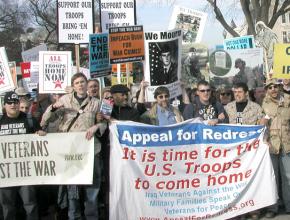The fight of their lives
Iraq war veteran reviews independent journalist Dahr Jamail's new book on the soldiers' resistance to the wars in Iraq and Afghanistan.
IN MARCH 2003, the Bush administration ordered U.S. troops to invade Iraq, beginning what would soon become the war that defines our generation. A war that was justified as a search for weapons of mass destruction soon became a prolonged occupation, forcing U.S. soldiers into the most intense combat since the Vietnam War.
Over the last six years, a majority of Americans have viewed the occupation of Iraq as an utter disaster. For the U.S., thousands of soldiers have been either killed or wounded, and trillions of dollars spent. For Iraqis, over 1 million have been killed due to the occupation, and over 5 million have been either internally or externally displaced from their homes.
Though mass sentiment has forced the Obama administration to reframe the occupation, the war itself continues, with U.S. soldiers supporting the combat operations of the Iraqi military.
While the U.S. economy spirals out of control in what has become the worst economic crisis since the Great Depression, the cost of the war will be felt for years to come.

In his book The Three Trillion Dollar War, economist Joseph Stiglitz points out that the cost of caring for veterans when they return home from Iraq and Afghanistan will exceed $388 billion. And every year, more and more veterans are seeking medical help from the Veterans Administration (VA). In 2008 alone, there were more than 263,000 veterans applying for VA health care.
Now, unemployment is on the rise, and more and more people are deciding that the military is their only option for survival. The irony in this is that the military will inevitably send these new recruits off to Iraq or Afghanistan, without any regard for their well-being. The backlogs in the VA system leave veterans waiting months or years for their disability claims to be approved--and now there will be even more veterans returning home as the military expands its ranks.
Though there has been confusion among some antiwar activists about what to next since Barack Obama was elected president, independent journalist Dahr Jamail's The Will to Resist: Soldiers Who Refuse to Fight in Iraq and Afghanistan begins to lay out the case that veterans who are most affected by the war may be the ones who lead the fight to end it.
In The Will to Resist, Jamail highlights the forms of resistance that are currently being used within the military by soldiers whose lives are at risk almost daily. These forms of resistance include going AWOL, search-and-avoid missions, fleeing abroad, and refusing to carry a loaded weapon.
Despite the risk of imprisonment and loss of medical benefits, more soldiers are confronting the U.S. military in order to end the occupations that they deem to be illegal and immoral. As Brian Casler, a Marine who served in Iraq and Afghanistan, put it, "Dissent starts as simple as saying, 'This is bullshit. Why am I risking my life?'"
ALONG WITH providing firsthand accounts of the resistance taking place within the ranks, Jamail also devotes two chapters to soldiers who face sexual assault and homophobia within the military. Interviews with female soldiers unravel the systemic climate of misogyny, which includes instances of "command rape" and sexual harassment, with cases usually ending in a severe backlash for the soldier who makes the charge.
Along with female soldiers, gay and lesbian service members are the subjects of abuse, especially with the institutionalized discrimination of "don't ask, don't tell." In the book, there are stories of soldiers who pose as straight in order to avoid conflict. This ultimately forces the service members to confront their own roles in the military.
With the question of "don't ask, don't tell" being confronted by the lesbian, gay, bisexual and transgender (LGBT) community, it's more important than ever to give gay and lesbian service members a voice in this debate.
When LGBT soldiers are released from military service due to their sexual orientation, they lose all of their access to medical treatment from the VA, whether or not they served in combat. This means that thousands of soldiers are being kicked to the curb while the U.S. government gets out of paying for the treatment that they rightfully deserve.
But the dehumanization is not solely within the military itself. It is also used as a way to force soldiers to see the Iraqi people as enemies. As one Marine quoted in The Will to Resist puts it,
The primary objective appeared to be to mistreat and dehumanize your guys. I could not do it, not to my men and not to those people. I like the Iraqis, I like the Afghanis. Why were we treating them like shit? That is when I really started questioning what the hell was going on.
While the antiwar movement is trying to figure out which way to go, veterans themselves are already developing forms of resistance against the military occupations in Iraq and Afghanistan. This is especially true for Victor Agosto and Travis Bishop, two Fort Hood soldiers currently serving time in prison for refusing to deploy to Afghanistan.
As Bishop said in a blog entry upon being sentenced, "Victor and myself are starting something big...and it is now up to all of you to continue on." This begins with reading Dahr Jamail's The Will to Resist.


